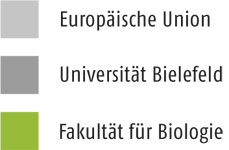Forschung

Profil
Die Forschung an der Fakultät lässt sich in übergreifenden Schwerpunkten verorten: "Individualität & Interaktion", "Nachhaltigkeit & Ressourceneffizienz" sowie "Netzwerke: Von Genen über Metabolismus zu Diversität". Diese Schwerpunkte finden sich in Profilschwerpunkten der Universität Bielefeld und grand challenges der Europäischen Union wieder.
Individualität & Interaktion
Individualität beschreibt die Einzigartigkeit einer Zelle, eines Organismus oder eines Systems, deren Betrachtung zunehmend als ein die Biologie durchdringendes Phänomen in den Vordergrund tritt. Innerhalb jedes Individuums finden Veränderungen und Anpassungen an die Umwelt und im Laufe der Alterung statt, deren Ausmaß jedoch sehr unterschiedlich sein kann. Außerdem existieren Individuen zwar unabhängig voneinander, interagieren bzw. kooperieren aber in funktional übergeordneten Geweben, Populationen oder Ökosystemen. Wir erforschen sowohl individuelle Unterschiede als auch die Regulation interagierender Systeme.
Nachhaltigkeit & Ressourceneffizienz
Nachhaltigkeit und Ressourceneffizienz sind in unserer sich ändernden Gesellschaft weltweit zunehmend von vitaler Bedeutung und stellen wichtige Werte dar. Ob gesunde Ernährung, intakte Ökosysteme, Rohstoffwandel in der Produktion oder saubere Energie: Wir lernen von ressourceneffizienten Strategien der Natur, indem wir sie charakterisieren, die Mechanismen modellieren und abstrahieren und schließlich implementieren.
Netzwerke: Von Genen über Metabolismus zu Diversität
Molekulare, zelluläre und organismische Netzwerke mit ihren sich daraus ergebenden Eigenschaften spiegeln die Komplexität biologischer Systeme wider. Wir untersuchen, welche Arten von Interaktionen die Netzwerke charakterisieren, wie sich Netzwerke über die Zeit ändern und wie sie auf Umweltbedingungen reagieren. Dabei gehen wir auch der Frage nach, welche Gemeinsamkeiten bzw. Unterschiede es bei den Entscheidungsmechanismen auf den verschiedenen Untersuchungsebenen gibt.

